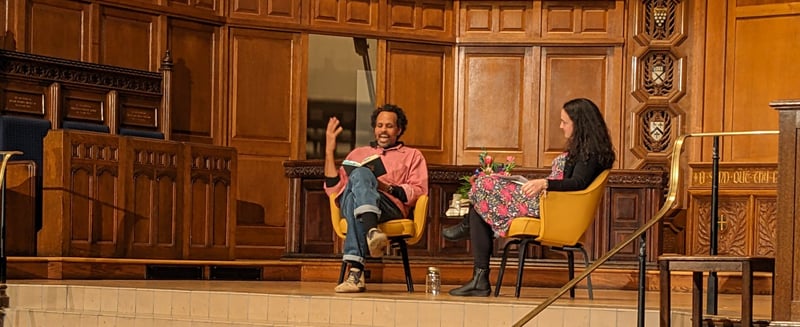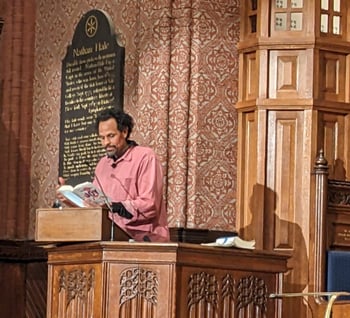
Ross Gay in conversation with Yale University Chaplain Maytal Saltiel at Battell Chapel. Dominic Warshaw photos.
There is something very wrong and very right about watching poet Ross Gay pour out memory, joy, cuss words, gratitude and critique.
Right: the hymn books in the pews, Gay’s rolled jeans, the nectar of his loud voice filling up the space. Wrong: the mediator attempting to grapple with the world’s heartache without naming victims or causes. She is careful not to implicate Yale in New Haven’s wealth disparity. Her eyes water from the smoke rising from Gaza, or from the effort of not saying Gaza.
Gay is not a purist. That much is clear in his conversation with Yale University Chaplain Maytal Saltiel Wednesday evening.
His practice is at the junction of sorrow and delight. He is attentive, with his whole body attentive, to the connections we see and those we don’t see (by deficit of attention or by institutional constraint).
To reside in joy, Gay said, is to practice one’s entanglement. To be entangled is to be in community. To witness each other in grief, from which proceeds graduations, cookouts, carpools and vigils. To approach all these with wonder, which is to say newness, which is to say don’t be a know-it-all. New Haven is as entangled as it gets.
 Reading from Catalog of Unabashed Gratitude, which won the 2015 National Book Critics Circle Award and the 2016 Kingsley Tufts Poetry Award, and Inciting Joy, which was released in 2022, Gay does not shirk these contradictions. Sometimes singing, sometimes departing from the text with sly correctives, he goes out to meet them.
Reading from Catalog of Unabashed Gratitude, which won the 2015 National Book Critics Circle Award and the 2016 Kingsley Tufts Poetry Award, and Inciting Joy, which was released in 2022, Gay does not shirk these contradictions. Sometimes singing, sometimes departing from the text with sly correctives, he goes out to meet them.
His voice gets softer when he answers a question about practicing gratitude in a world that’s burning.
“Sorrow may incline one to dance,” he offered.
But does dancing put out fires? Maybe.
From the lectern, the pipes of the organ hunched around his lanky body, Gay spoke about “the religion of capitalism,” its gospel of scarcity, and its magical belief in endless growth. He counseled his audience to abandon productive time, which is measured in “sacks of cotton,” and to inhabit other rhythms.
To be un-diligent. And if time can be stopped—on a back porch, or within the breathed interior of a poem—then the bars of other prisons may also prove elastic. Maybe.